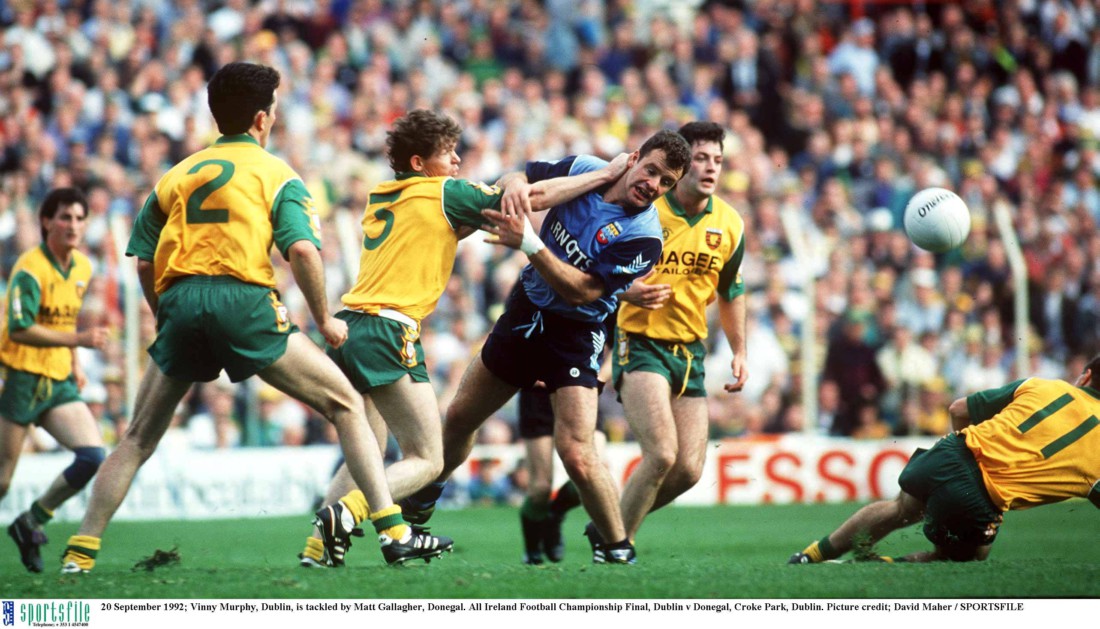DEFENSIVE strategies have developed during the past few years, but perhaps not as much as people think.
According to Matt Gallagher, the ideas and theories that define how the county teams play were in place when he was manning the defence for Donegal in the ‘80s and ‘90s.
However, the work that teams put into those ideas has increased.
Gallagher said: “Some of the the stuff you hear now, like turnovers and kick-outs and restarts, all the teams we played on worked on those as well. Not to the same extent maybe, but we worked on them.
“Other teams weren’t organised as well as they are now, whereas every team is well-organised for kick-outs. But we worked on them. You knew which side the ’keeper favoured and the targets that he was looking for. You might think teams didn’t work on that, but they did.
“Turnovers, forwards scoring, defenders scoring, these aren’t new things. It’s just that teams have brought it to a different level.”
One of the aspects of the modern game that is talked about a lot is the restart, or what used to be known as the kick-out.
“Even this year, focusing on the kick-outs, in the All-Ireland final Mayo forced (Stephen) Cluxton to go very short. They closed down the midfield avenue and forced him to go short. They targeted him very successfully. Even that doesn’t guarantee that you are going to win.
“A lot of that was done before, but teams do a lot more of it now. Teams nowadays would spend a lot more on tactics and what they are going to do in specific situations.”
Gallagher said that those strategies of controlling the game, and controlling your opponent has been happening for years. He explained a simple strategy that Donegal used.
“We would target trying to win the throw-in and trying to get the ball in very early to the full-forward line because early in the game it was easier to get a free kick, so you got the first score on the board, then you could concentrate on the next kick-out and then get it in early again, then you could get another score and if that happened then all of a sudden you are two points up.
“If we lost the throw-in we would make it difficult for the other team. We would try and make sure that they were putting the ball backwards rather than forwards.”
It was in that area of defence, of forcing teams backwards, where Gallagher did his work. He was a key member of the Donegal rearguard during his career and was full back in the 1992 All-Ireland winning team.
“When I played I tried to keep the two players outside me as close as possible. Barry (McGowan) or John Joe (Doherty) had a licence to go but I hadn’t. I had to sit tight and man the square. Martin (Gavigan) was the same. He had to sit tight and hold the middle. If we held the middle we could recover if something happened. But if we left the middle we were inviting trouble. If we did go forward then we had to make sure that we kill the ball and we could set up.”
He said that the development of the defence came from a need to stop goals.
“We would have made sure that we didn’t concede goals. It’s psychologically a big score.”
In order to stop that big score, strategies are needed.
Gallagher explained how the development of defensive strategy has been focused on stopping those psychologically important goals.
“If you look at the defensive formation we had, we might have had one extra defender, a midfielder or a half-forward dropping back. But now you have eight defenders and two or three forwards
“That makes it difficult to create a goal. It is a way to defend the D to stop a point-scoring opportunity.
“People will shout from the sideline to shoot when the ball is being passed around the perimeter, but it is not so easy to do that. There are times when teams should shoot and they don’t.”
The modern game and modern defence have meant that some pundits regard the game as boring and pedestrian. The reason is because of those defensive structures. But not all teams are boring according to Gallagher.
“The thing about Dublin and Kerry is that they were good to watch.
“When we were playing we were good to watch. We maybe didn’t win as much. That’s because we weren’t cynical.
“Every team is cynical. If you want to get to the top you have to have cynicism. Even in soccer, teams will be cynical.
“For years Donegal were good to watch, but we weren’t cynical enough. Eventually we acquired that.”
Receive quality journalism wherever you are, on any device. Keep up to date from the comfort of your own home with a digital subscription.
Any time | Any place | Anywhere












